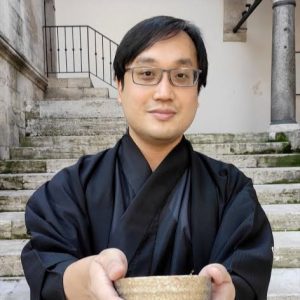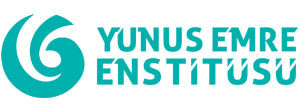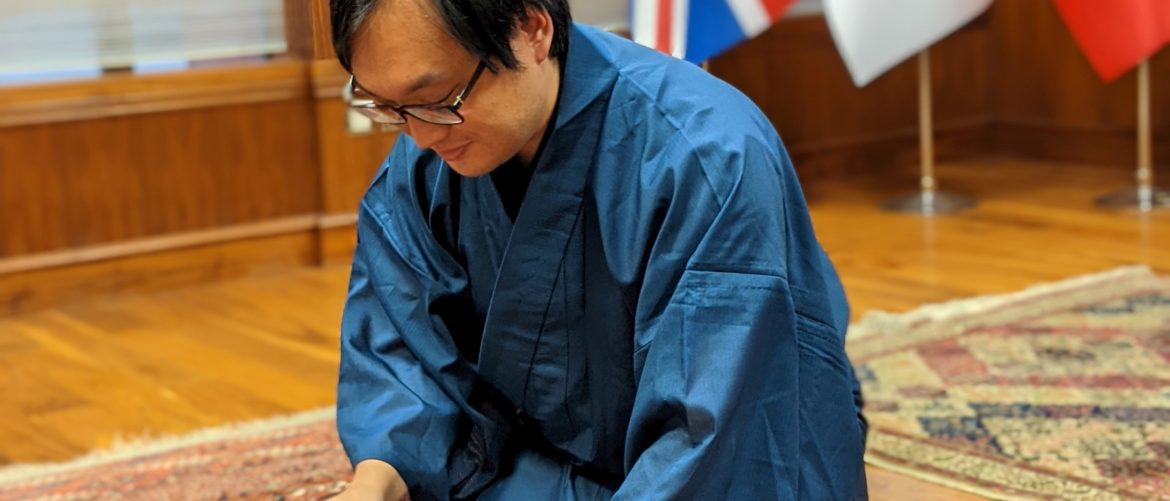Japanese tea ceremony and talk on the affinity between Yunus Emre’s poetry and Japanese culture by Dr Naoki Yamamoto held at Yunus Emre Institute London.
.

.
Situated on different ends of the world, Turkish and Japanese cultures are not often compared. Much less is said about what traditions, philosophies and cultural landscapes they share.
Yunus Emre Institute London ventured on the cross-cultural bridge on Thursday June 9th, 7pm with a unique talk focussing on the affinity between Yunus Emre’s poetry and Japanese culture by Dr Naoki Yamamoto. The unique event included a traditional Japanese tea ceremony and matcha tea tasting which participants could taste and help prepare!
.

.
Yunus Emre was one of the most influential poets of Anatolia and a thinker who had a profound influence on the spiritual world of the Turkish people. His poems, written in the 14th century, use plain Turkish language that all could enjoy and yet succeed in expressing profound philosophical concepts which are hard to understand and harder still to explain. The influence of Yunus Emre’s spirituality is not limited to Anatolia but has an interesting affinity with Japanese culture.
.

.
During the talk, Dr Yamamoto touched on Yunus Emre’s understanding of the sacred, nature, and mankind offers key similarities found within Japanese culture’s spiritual practice, which aims for harmony among sky, nature, and humanity. Dr Naoki Yamamoto, who specializes in Ottoman Sufism and traditional Japanese culture, introduced Yunus Emre’s poems, his thoughts, and key themes that have influenced him as a Japanese person.
Dr Yamamoto started his talk touching on the core elements that made up Japanese spirituality and focused on the importance of the balance between the Heaven, the Earth and the human. He compared this spiritual lens with the Turkish Sufi tradition of Mizan (divine balance). He traced this link across art, traditions and poetry. Dr Yamamoto principally compared the choreographed and deeply meaningful Japanese tea ceremony with the Turkish Sufi culinary tradition.
.

.
Engaging with the participants, which included senior academics, artists and significant figures from various intellectual bacgrounds, Dr Yamamoto spent the second half of the practicing the Japanese cultural tea ceremony. Participants also were given the opportunity to try make the matcha tea themselves in the traditional Japanese fashion. The ceremony started with a mutual bow and a phrase meaning, simply, ‘thank you for giving me this great opportunity’ repeated between the maker of the tea and the guests. Prior to the tea being made the participants were also given lokum, a Turkish twist to the traditional sweets eaten before the matcha was made.
.

.
Seated on the floor across from 3 guests at a time, Dr Yamamoto began his abridged tea ceremony by ‘purifying’ each item he would be using, from the bamboo whisks to the traditional tea bowl. The tea set in front of him represented the ‘macro-cosmos’ with each part of the set representing the 5 elements in East Asian culture (wood, fire, earth, water, and metal). This macro-cosmos was balanced by the micro-cosmos represented by Dr Yamamoto, who stressed the importance of balance in both Japanese and Turkish spiritual cultures.
The Japanese Sufi then showed the participants how to make the tea, explaining the specific movement and their meanings, including the final step in drinking the tea where the drink would be slurped to show respect and satisfaction!
After many in the audience had a go at making the tea, the evening came to a warm close and a new spiritual bridge was built from Yunus Emre Insititute London to Japan.
About the Speaker:
 Dr Naoki Yamamoto is currently an assistant professor at the Graduate school of Turkic Studies, Marmara University. He completed his Ph.D. at the Graduate School of Asia and Africa Studies, Kyoto University, in 2018. He specializes in Ottoman Sufism and traditional Japanese culture. His publications include a Japanese translation of Sulami’s Futuwwa and Introduction to Sufism: A Comparison with Shonen Manga. Dr Naoki Yamamoto is currently conducting a comparative study of Turkish and Japanese cultures. He believes that Japanese and Turkish cultures share a spirituality. He is translating Yunus Emre’s poetry into Japanese. He also runs the “East Asian Culture Course” in Turkey and has held tea ceremony workshops at various universities in Istanbul.
Dr Naoki Yamamoto is currently an assistant professor at the Graduate school of Turkic Studies, Marmara University. He completed his Ph.D. at the Graduate School of Asia and Africa Studies, Kyoto University, in 2018. He specializes in Ottoman Sufism and traditional Japanese culture. His publications include a Japanese translation of Sulami’s Futuwwa and Introduction to Sufism: A Comparison with Shonen Manga. Dr Naoki Yamamoto is currently conducting a comparative study of Turkish and Japanese cultures. He believes that Japanese and Turkish cultures share a spirituality. He is translating Yunus Emre’s poetry into Japanese. He also runs the “East Asian Culture Course” in Turkey and has held tea ceremony workshops at various universities in Istanbul.

